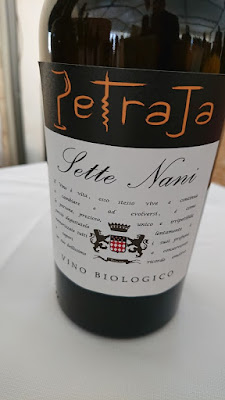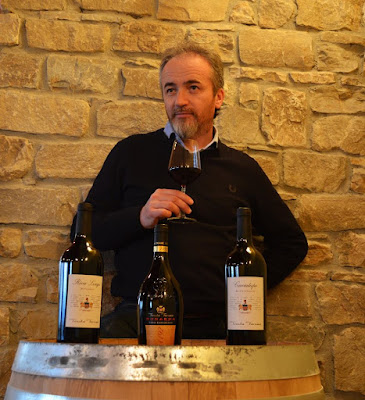The Festa del Bonarda at Rovescala in March was not all Bonarda/Croatina. In fact a few of the best wines were from other grapes altogether.
 |
| Tenuta Fornace had a very elegant table including beautiful squat bottles pioneered by Azienda Agricola COS. |
What we did try and what blew our hats off was their Gocce di Luce and Sette Nani white wines.
Fornace describe this as 'white wine obtained only from overripe grapes of Timorasso. It isn't a desert wine but it is wonderfully rich and full 'concentrated golden yellow, intense but really full of light and vital energy.' And so it was: Stockhausen might have included it in his operatic cycle LICHT.
The other white on tasting was the 'Sette Nani,' so-called because 'the wine has characteristics of seven little known grape vareties. These are listed as 'mainly Favorita...an ancient native white grape of Piedmont, combined with other native wines (sic) such as Timorasso and Cortese.' One wonders what the other four are.
Elsewhere at the tasting we noticed two bottles made by Andrea Rossi, current owner, agronomist and wine-maker at Tenuta Fornace under his own name with Fornace credited only with the bottling. A Favorita and a Timorasso from the Colli Tortonesi.
 |
| dried Barbera grapes |
Other wines include a Barbera from non-dried grapes, a Pinot Noir, a Cabernet Sauvignon, a Riesling, a Pinot Grigio, a Chardonnay, a Rose from Pinot Noir, a Malvasia 'Auslese' and a Passito wine from Nebbiolo, Barbers and Merlot.
On the strength of the two wines tasted, we can imagine these may also be outstanding.
There is nonetheless something intriguing about Tenuta Fornace. None of their wines is to be found in any territory on Winesearcher whether Pro or otherwise. Their website is a Facebook page. A small amount of information may be found on Andrea Rossi's Linkedin page. Fornace isn't mentioned by D'Agata or in 'Wine Grapes' or in hardly any of the many websites devotes to organic winemaking. They do seem to be big in Hong Kong however.
This booklet is serious and informative. The pages concering the vinetyard and winemaking bear reproducing:
In the vineyard
- we keep the grass lawn stable preserving the countless species of wild herbs that attract an infinity of species of useful insects different from eachotherand very important for the natural balance of the vineyard.
- we preserve the wild hedges on the edges of the vineyards, which are also essential for the repopulation of many species of birds almost extinct but very important for the perfect ecosystem of the vineyard.
- we preserve the integrity of the soil of our vine gardens in order to save and even multiply the very useful and indispensible micro-organisms contained in the first layer of the soil.
- we do not use chemical fertilizers or even organic ones because we do not fertilize the vines. Only after a period of five to six years and only where it is strictly necessary, we use the green manure in alternate rows, sowing bell beans or other pulses that supply nitrogen to the soil through their root systems.
- we do not use phyto-stimulents because they would have a doping effect on the properties of plants.
- all the wood of winter pruning, the excess vegetation of the summer pruning and the three or four grass mowings are thoroughly ground into the vineyard and left on the soil right where they are, to form the humus.
- we do not use anti-germinating herbicides which do not allow the seeds of the various species of grass to sprout.
- we do not use dessicants that would act on the lymphatic vessels of the sprouted herbs.
- we do not use systemic plant protection products that are always based on synthetic molecules that enter the circulation in the plant and inter-laminar cytotropic products.
- we do not use chemical insecticides and acaricides.
- also, on the grapes we do not use antibotrytics that have an anti-rot effect.
- we also do not use many other substances such as foliar fertilizers, maturing substnces etc.
In the wine-cellar
- we do not use all those substances and additives that are permitted in conventional wines.
- with the bio-vegan method we do not even use all the adjuvants that are allowed in the organic method and which are almost all animal origin such as: jellies, fish glue, egg albumin, caseins and potassium caseinate, lysozyme etc.
- we do not add tannins to the wines.
- We do not add malolactic bacteria for malolactic fermentation but we let it happen spontaneously.
- we ferment all the wine sonly and exclusively with their indiginous yeasts naturally contained in the grapes.
- we do not add the sulfites to the wines but let them contain only the natural ones that form in very small quantities during the fermentation phase.







No comments:
Post a Comment